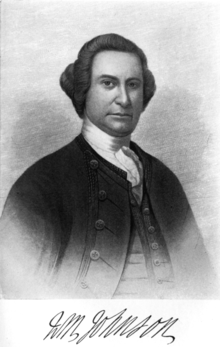Johnson baronets

1st Baronet, of New York
There have been three Baronetcies created for persons with the surname Johnson, one in the Baronetage of Great Britain and two in the Baronetage of the United Kingdom. As of 2010 one creation is extant, one dormant and one extinct.
The Johnson Baronetcy, of New York in North America, was created in the Baronetage of Great Britain on 27 November 1755 for the soldier William Johnson. A descendant of the O'Neill dynasty, his family name was originally MacShane (Irish: Mac Seáin), of which Johnson is a translation. The baronetcy was awarded for his victories at Crown Point and the Battle of Lake George earlier that year. His son, the second Baronet, was a loyalist leader during the American Revolution. Two other members of the family may also be mentioned. Guy Johnson, nephew of the first Baronet, was a distinguished soldier. John Ormsby Johnson, son of Colonel Charles Christopher Johnson, seventh son of the second Baronet, was a Vice-Admiral.
The Johnson Baronetcy, of Bath, was created in the Baronetage of the United Kingdom on 1 December 1818 for Henry Johnson, a Colonel in the 5th Regiment and Governor of Ross Castle. He was the younger brother of Sir John Johnson-Walsh, 1st Baronet, of Ballykilcavan (see Johnson-Walsh Baronets). The second Baronet fought with distinction in the Peninsular War. The fourth Baronet was a Brigadier-General in the King's Own Yorkshire Light Infantry. The presumed seventh Baronet never successfully established his claim to the title and was never on the Official Roll of the Baronetage. Likewise, as of 13 June 2007 the presumed eighth Baronet has not successfully proven his succession and is not on the Official Roll of the Baronetage, with the baronetcy dormant since 1986. For more information, follow this link.
Two other members of the family may also be mentioned. Sir Charles Cooper Johnson, sixth son of the second Baronet, was a General in the British Army. His son Eliot Philipse Johnson was a Brigadier-General in the British Army. The latter was the father of the presumed seventh Baronet.
The Johnson Baronetcy, of Dublin, was created in the Baronetage of the United Kingdom on 24 November 1909 for the Irish lawyer and politician William Moore Johnson. The title became extinct on his death in 1919.
Johnson baronets, of New York (1755)
- Sir William Johnson, 1st Baronet (1715–1774)
- Sir John Johnson, 2nd Baronet (1742–1830)
- Sir Adam Gordon Johnson, 3rd Baronet (1781–1843)
- Sir William George Johnson, 4th Baronet (1830–1908)
- Sir Edward Gordon Johnson, 5th Baronet (1867–1957)
- Sir John Paley Johnson, 6th Baronet (1907–1975)
- Sir Peter Colpoys Paley Johnson, 7th Baronet (1930–2003)
- Sir (Colpoys) Guy Johnson, 8th Baronet (born 1965)
The heir apparent is Colpoys William Johnson (born 1993).
All Johnson Baronets of New York from Sir Adam onward are, through his mother Ann Watts, descendants of the Schuyler family, the Delancey family, and the Van Cortlandt family of British North America. [1] [2]
Johnson baronets, of Bath (1818)
- Sir Henry Johnson, 1st Baronet (1748–1835)
- Sir Henry Allen Johnson, 2nd Baronet (1785–1860)
- Sir Henry Franks Frederic Johnson, 3rd Baronet (1819–1883)
- Sir Henry Allen William Johnson, 4th Baronet (1855–1944)
- Sir Henry Allen Beaumont Johnson, 5th Baronet (1887–1965)
- Sir Victor Philipse Hill Johnson, 6th Baronet (1905–1986)
- Robin Eliot Johnson, presumed 7th Baronet (1929–1989)
- Patrick Eliot Johnson, presumed 8th Baronet (born 1955)
The presumed heir apparent to the baronetcy is Richard Eliot Johnson (born 1983), eldest son of the presumed 8th Baronet.
Johnson baronet, of Dublin (1909)
- Sir William Moore Johnson, 1st Baronet (1828–1919)
See also
Notes
- ^ Wells, Albert. Watts (Watt), <in New York and in Edinburgh, Scotland.> Also Watts, Wattes, Wattys, Wathes, de Wath, Le Fleming, (in England.) 1898
- ^ ThePeerage.com page 15497 http://www.thepeerage.com/p15497.htm#i154970 Accessed March 15, 2015.
References
- Kidd, Charles, Williamson, David (editors). Debrett's Peerage and Baronetage (1990 edition). New York: St Martin's Press, 1990, [page needed]
- Leigh Rayment's list of baronets
